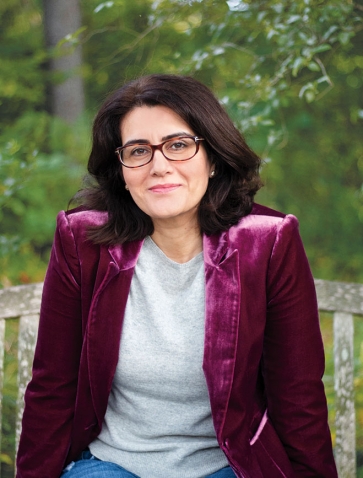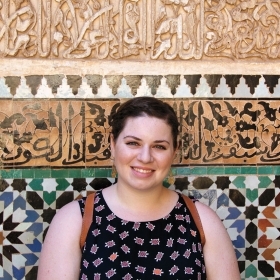On Aug. 2, 1990—during the months after Diana Abouali ’93 finished her first year at Wellesley—Iraq invaded Kuwait, where Diana was spending the summer with her family. Diana was able to escape to Canada, but her father remained trapped in Kuwait for several more weeks. Though he was physically safe, his financial situation changed overnight, and he could no longer afford tuition. Terrified, Diana explained the situation to Wellesley’s financial aid office and was told that, whatever help she needed, she would receive. “It [made] me think that in the midst of crisis and trauma, there is goodness and kindness,” she says.
Diana is now the one in a position to assist others in need, and to boost their spirits. As director of the Arab American National Museum (AANM) in Dearborn, Mich., Diana does national outreach and also serves a local population that is over 40 percent Arab. She notes that AANM is the only museum of its kind, with an exclusive focus on the Arab American experience. The Ford Foundation recently awarded her museum a $2 million grant, hailing it as a cultural treasure.
Diana has directed the museum since 2019—a career milestone she wouldn’t have predicted for herself. Born in Toronto to Palestinian immigrants, raised in Kuwait, and educated in the United States, she anticipated a career in academia and taught for years at Harvard and Dartmouth about the Middle East. She loves community and adventure, though, and so she opted to move back to the Levant, where she got a job at the Palestinian Museum in Birzeit. After that, she worked in Jordan helping to maintain Petra, the city carved in stone. In addition, Diana also counseled Syrian refugees. That trail of cross-cultural experience led her to the museum in Dearborn, and it continues to inform her style of leadership. “I encourage staff to take risks,” she says.
That has proved to be an advantage during this past roller coaster of a year. Early on in the pandemic, AANM operated as an occasional site for charitable food distribution. As time went on, the museum’s cultural programming resumed and was very well received—especially its film program, which went online. Diana says a hit with viewers was Brooklyn Inshallah, a documentary about politics in the heavily Arab area of Bay Ridge, Brooklyn, which is sometimes referred to as “Little Palestine.” According to the film, only 250 out of an estimated 40,000 Arab American residents of Bay Ridge were registered to vote in 2016. Diana says the film highlights how cultural barriers can be an obstacle to voting, even in a place as diverse as New York City.
In addition to film offerings, AANM’s culinary programs—via Instagram—are popular. The museum partners weekly with Arab American chefs across the country and encourages IG followers to cook along. Prepared dishes have ranged from appetizers like focaccia with za’atar (a traditional spice blend) to more complex entrees. Diana is looking forward to when they feature fahsah, an iconic, fenugreek-infused Yemeni stew. “It’s shredded [lamb] and potatoes made in a pot, served boiling. Yemeni food has been the big discovery—I never had it before I came to Dearborn!”
Of course, Diana is eager for her museum to reopen to the public, which she hopes will happen in 2021. She has favorite objects she misses from the collection (like a pair of shoes from a 20th-century Syrian immigrant who passed through Ellis Island) and an exhibit that she dreams of putting together (a survey of 20th-century Arabic publishing).
When asked the most important thing Wellesley readers need to know about the Arab world, she has no easy answer. “[The Arab world] spans two continents, 400 million people, 22 nations, diverse religions, multiple languages … we need to approach it with the knowledge that [the region] is diverse.”








We ask that those who engage in Wellesley magazine's online community act with honesty, integrity, and respect. (Remember the honor code, alums?) We reserve the right to remove comments by impersonators or comments that are not civil and relevant to the subject at hand. By posting here, you are permitting Wellesley magazine to edit and republish your comment in all media. Please remember that all posts are public.